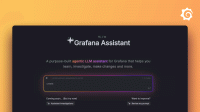This is documentation for the next version of Grafana Alloy Documentation. For the latest stable release, go to the latest version.
import.http
import.http retrieves a module from an HTTP server.
Usage
import.http "<LABEL>" {
url = <URL>
}Arguments
You can use the following arguments with import.http:
Blocks
You can use the following blocks with import.http:
The > symbol indicates deeper levels of nesting.
For example, client > basic_auth refers to an basic_auth block defined inside a client block.
client
The client block configures settings used to connect to the HTTP server.
bearer_token, bearer_token_file, basic_auth, authorization, and oauth2 are mutually exclusive, and only one can be provided inside of a http_client_config block.
no_proxy can contain IPs, CIDR notations, and domain names. IP and domain names can contain port numbers.
proxy_url must be configured if no_proxy is configured.
proxy_from_environment uses the environment variables HTTP_PROXY, HTTPS_PROXY, and NO_PROXY (or the lowercase versions thereof).
Requests use the proxy from the environment variable matching their scheme, unless excluded by NO_PROXY.
proxy_url and no_proxy must not be configured if proxy_from_environment is configured.
proxy_connect_header should only be configured if proxy_url or proxy_from_environment are configured.
authorization
The authorization block configures custom authorization to use when polling the configured URL.
credential and credentials_file are mutually exclusive, and only one can be provided inside an authorization block.
Warning
Using
credentials_filecauses the file to be read on every outgoing request. Use thelocal.filecomponent with thecredentialsattribute instead to avoid unnecessary reads.
basic_auth
The basic_auth block configures basic authentication to use when polling the configured URL.
password and password_file are mutually exclusive, and only one can be provided inside a basic_auth block.
Warning
Using
password_filecauses the file to be read on every outgoing request. Use thelocal.filecomponent with thepasswordattribute instead to avoid unnecessary reads.
oauth2
The oauth2 block configures OAuth 2.0 authorization to use when polling the configured URL.
client_secret and client_secret_file are mutually exclusive, and only one can be provided inside an oauth2 block.
Warning
Using
client_secret_filecauses the file to be read on every outgoing request. Use thelocal.filecomponent with theclient_secretattribute instead to avoid unnecessary reads.
The oauth2 block may also contain a separate tls_config sub-block.
no_proxy can contain IPs, CIDR notations, and domain names. IP and domain names can contain port numbers.
proxy_url must be configured if no_proxy is configured.
proxy_from_environment uses the environment variables HTTP_PROXY, HTTPS_PROXY, and NO_PROXY (or the lowercase versions thereof).
Requests use the proxy from the environment variable matching their scheme, unless excluded by NO_PROXY.
proxy_url and no_proxy must not be configured if proxy_from_environment is configured.
proxy_connect_header should only be configured if proxy_url or proxy_from_environment are configured.
tls_config
The tls_config block configures TLS settings for connecting to HTTPS servers.
The following pairs of arguments are mutually exclusive and can’t both be set simultaneously:
ca_pemandca_filecert_pemandcert_filekey_pemandkey_file
When configuring client authentication, both the client certificate (using cert_pem or cert_file) and the client key (using key_pem or key_file) must be provided.
When min_version isn’t provided, the minimum acceptable TLS version is inherited from Go’s default minimum version, TLS 1.2.
If min_version is provided, it must be set to one of the following strings:
"TLS10"(TLS 1.0)"TLS11"(TLS 1.1)"TLS12"(TLS 1.2)"TLS13"(TLS 1.3)
Example
This example imports custom components from an HTTP response and instantiates a custom component for adding two numbers:
module.alloy
declare "add" {
argument "a" {}
argument "b" {}
export "sum" {
value = argument.a.value + argument.b.value
}
}main.alloy
import.http "math" {
url = <SERVER_URL>
}
math.add "default" {
a = 15
b = 45
}


